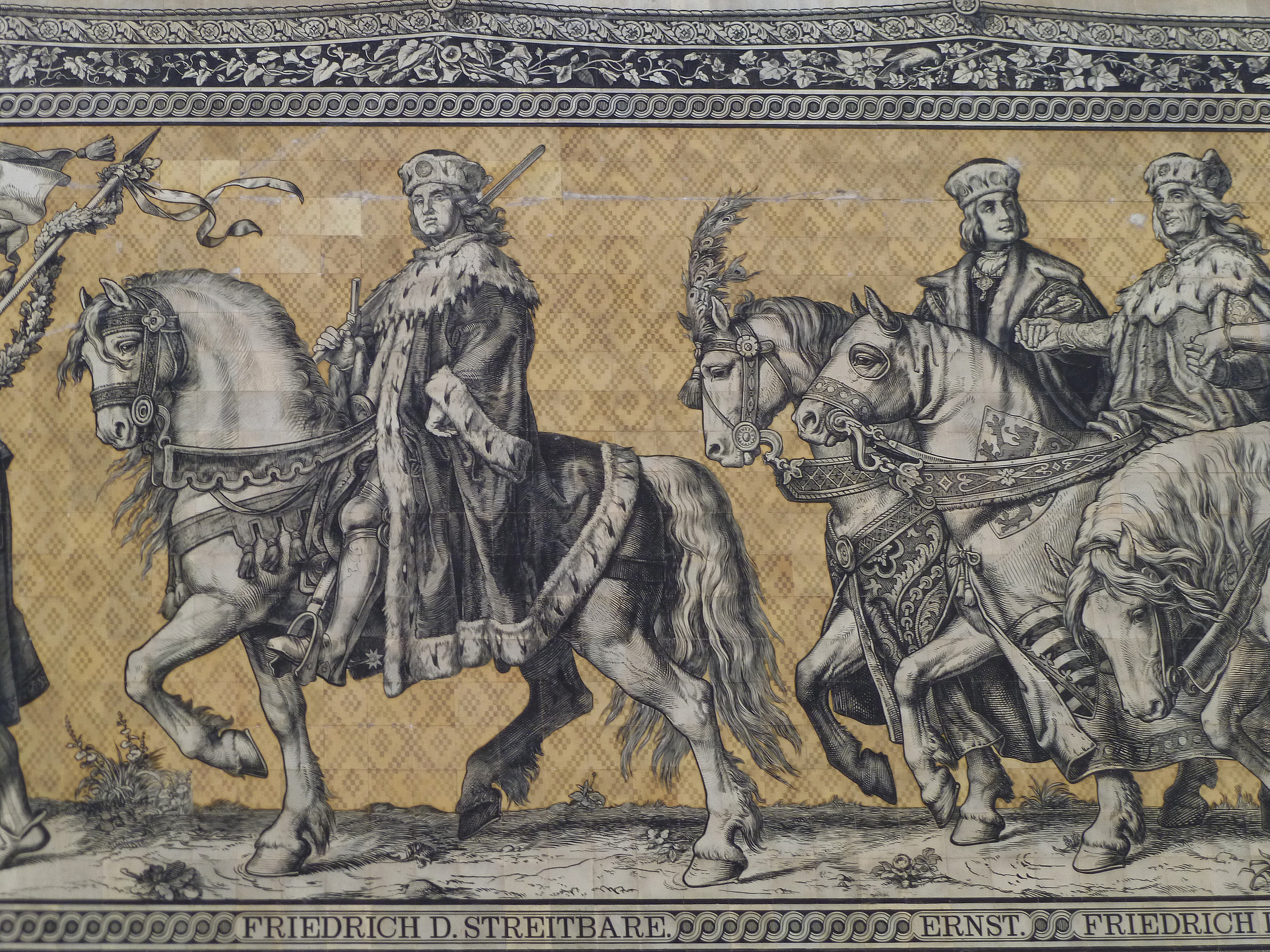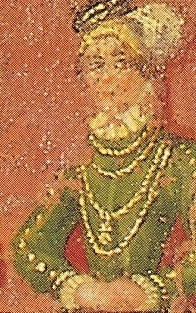Ernest, Elector Of Saxony on:
[Wikipedia]
[Google]
[Amazon]
Ernest (24 March 144126 August 1486) was
 Ernst was born in
Ernst was born in
 In
In
Elector of Saxony
The Electorate of Saxony, also known as Electoral Saxony (German: or ), was a territory of the Holy Roman Empire from 1356–1806. It was centered around the cities of Dresden, Leipzig and Chemnitz.
In the Golden Bull of 1356, Emperor Charles ...
from 1464 to 1486.
Ernst was the founder and progenitor of the ''Ernestine line'' of Saxon princes.
Biography
Meissen
Meissen (in German orthography: ''Meißen'', ) is a town of approximately 30,000 about northwest of Dresden on both banks of the Elbe river in the Free State of Saxony, in eastern Germany. Meissen is the home of Meissen porcelain, the Albrecht ...
, the second son (but fourth in order of birth) of the eight children of Frederick II, Elector of Saxony
Frederick II, The Gentle (''Friedrich, der Sanftmütige''; Frederick the Gentle) (22 August 1412 – 7 September 1464) was Elector of Saxony (1428–1464) and was Landgrave of Thuringia (1440–1445).
Biography
Frederick was born in Leipzig ...
and Margaret of Austria, sister of Frederick III, Holy Roman Emperor
Frederick III (German: ''Friedrich III,'' 21 September 1415 – 19 August 1493) was Holy Roman Emperor from 1452 until his death. He was the fourth king and first emperor of the House of Habsburg. He was the penultimate emperor to be crown ...
.
The death of his older brother Frederick (1451) made him the new heir apparent to the position of Elector of Saxony.
In 1455 Ernst was briefly kidnapped, along with his brother Albert, by the knight Kunz von Kaufungen
Kunz von Kaufungen (also known as Conrad von Kaufungen, or Kunz von Kauffungen; c. 1410 - 14 July 1455) was a German knight and military commander. A veteran of the Hussite wars, he also fought for Frederick II, Elector of Saxony against Frederic ...
an episode famous in German history
The Germani tribes i.e. Germanic tribes are now considered to be related to the Jastorf culture before expanding and interacting with the other peoples.
The concept of a region for Germanic tribes is traced to time of Julius Caesar, a Roman gen ...
as the (''i.e.'' The Stealing of the Princes).
In 1464, he succeeded his father as Elector of Saxony, and annexed Thuringia
Thuringia (; german: Thüringen ), officially the Free State of Thuringia ( ), is a state of central Germany, covering , the sixth smallest of the sixteen German states. It has a population of about 2.1 million.
Erfurt is the capital and larg ...
in 1482, and three years later (Treaty of Leipzig
The Treaty of Leipzig or Partition of Leipzig (German ''Leipziger Teilung'') was signed on 11 November 1485 between Elector Ernest of Saxony and his younger brother Albert III, the sons of Elector Frederick II of Saxony from the House of Wettin ...
, 1485) shared his territory with his brother Albert
Albert may refer to:
Companies
* Albert (supermarket), a supermarket chain in the Czech Republic
* Albert Heijn, a supermarket chain in the Netherlands
* Albert Market, a street market in The Gambia
* Albert Productions, a record label
* Alber ...
, until he arranged the division of the common possession.
According to the Treaty of Leipzig
The Treaty of Leipzig or Partition of Leipzig (German ''Leipziger Teilung'') was signed on 11 November 1485 between Elector Ernest of Saxony and his younger brother Albert III, the sons of Elector Frederick II of Saxony from the House of Wettin ...
he received an area around Wittenberg
Wittenberg ( , ; Low Saxon language, Low Saxon: ''Wittenbarg''; meaning ''White Mountain''; officially Lutherstadt Wittenberg (''Luther City Wittenberg'')), is the fourth largest town in Saxony-Anhalt, Germany. Wittenberg is situated on the Ri ...
, the southern Thuringia
Thuringia (; german: Thüringen ), officially the Free State of Thuringia ( ), is a state of central Germany, covering , the sixth smallest of the sixteen German states. It has a population of about 2.1 million.
Erfurt is the capital and larg ...
n part, the Vogtland
Vogtland (; cz, Fojtsko) is a region spanning the German states of Bavaria, Saxony and Thuringia and north-western Bohemia in the Czech Republic. It overlaps with and is largely contained within Euregio Egrensis. The name alludes to the former ...
and parts of the Pleissnerland. As a residence he selected Wittenberg
Wittenberg ( , ; Low Saxon language, Low Saxon: ''Wittenbarg''; meaning ''White Mountain''; officially Lutherstadt Wittenberg (''Luther City Wittenberg'')), is the fourth largest town in Saxony-Anhalt, Germany. Wittenberg is situated on the Ri ...
. He provided for the welfare of the country and introduced the constitution.
One year after the division, Ernest died in Colditz
Colditz () is a small town in the district of Leipzig, in Saxony, Germany. It is best known for Colditz Castle, the site of the Oflag IV-C POW camp for officers in World War II.
Geography
Colditz is situated in the Leipzig Bay, southeast of the c ...
, at the age of 46 years, the consequence of a fall from a horse.
Children
 In
In Leipzig
Leipzig ( , ; Upper Saxon: ) is the most populous city in the German state of Saxony. Leipzig's population of 605,407 inhabitants (1.1 million in the larger urban zone) as of 2021 places the city as Germany's eighth most populous, as wel ...
on 19 November 1460 Ernst married Elisabeth of Bavaria
Duchess Elisabeth Amalie Eugenie in Bavaria (24 December 1837 – 10 September 1898) was Empress of Austria and Queen of Hungary from her marriage to Emperor Franz Joseph I on 24 April 1854 until her assassination in 1898.
Elisabeth was ...
. They had seven children:
# Christina (25 December 1461, Torgau8 December 1521, Odense), married on 6 September 1478 to King John I of Denmark
John ( Danish, Norwegian and sv, Hans; né ''Johannes'') (2 February 1455 – 20 February 1513) was a Scandinavian monarch under the Kalmar Union. He was king of Denmark (1481–1513), Norway (1483–1513) and as John II ( sv, Johan II) S ...
#Frederick III, Elector of Saxony
Frederick III (17 January 1463 – 5 May 1525), also known as Frederick the Wise (German ''Friedrich der Weise''), was Elector of Saxony from 1486 to 1525, who is mostly remembered for the worldly protection of his subject Martin Luther.
Freder ...
(17 January 1463, Torgau5 May 1525, Lockau)
#Ernest
Ernest is a given name derived from Germanic languages, Germanic word ''ernst'', meaning "serious". Notable people and fictional characters with the name include:
People
*Archduke Ernest of Austria (1553–1595), son of Maximilian II, Holy Roman ...
(26 June 1464, Meissen3 August 1513, Halle), Archbishop of Magdeburg
The Archbishopric of Magdeburg was a Roman Catholic archdiocese (969–1552) and Prince-Archbishopric (1180–1680) of the Holy Roman Empire centered on the city of Magdeburg on the Elbe River.
Planned since 955 and established in 968, the Roman ...
(1476–1480), Bishop of Halberstadt
The Diocese of Halberstadt was a Roman Catholic diocese (german: Bistum Halberstadt) from 804 until 1648.
(1480–1513)
#Adalbert
Adalbert is a German given name which means "noble bright" or "noble shining", derived from the words ''adal'' (meaning noble) and ''berht'' (shining or bright). Alternative spellings include Adelbart, Adelbert and Adalberto. Derivative names inclu ...
(8 May 1467, Meissen1 May 1484, Aschaffenburg), Administrator of Mainz
# Johann, Elector of Saxony (30 June 1468, Meissen16 August 1532, Schweinitz)
#Margarete
Margarete is a German feminine given name. It is derived from Ancient Greek ''margarites'' (μαργαρίτης), meaning "the pearl". Via the Latin ''margarita'', it arrived in the German sprachraum. Related names in English include Daisy, Gr ...
(4 August 1469, Meissen7 December 1528, Weimar), married on 27 February 1487 to Henry I of Lüneburg
Henry the Middle, Duke of Brunswick-Lüneburg (15 September 1468 – 19 February 1532) was Prince of Lüneburg from 1486 to 1520.
Life
Henry of Brunswick-Lüneburg, the son of Otto V of Lüneburg and Anne of Nassau-Siegen (d. 1514), Anne of Nassau ...
#Wolfgang (c. 1473, Meissenc. 1478, Torgau).
Ancestry
References
Sources
* {{DEFAULTSORT:Ernest Of Saxony, Elector 1441 births 1486 deaths People from Meissen Prince-electors of Saxony House of Wettin Saxon princes